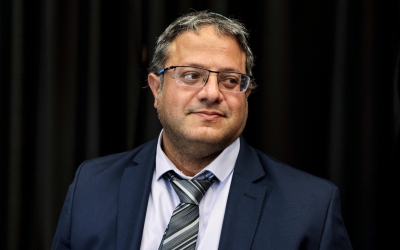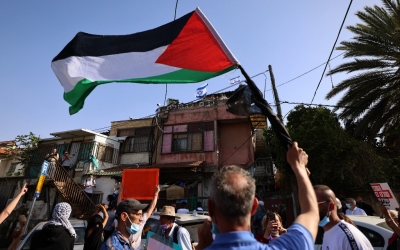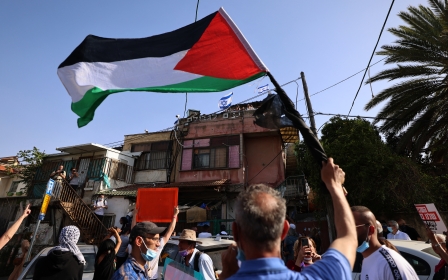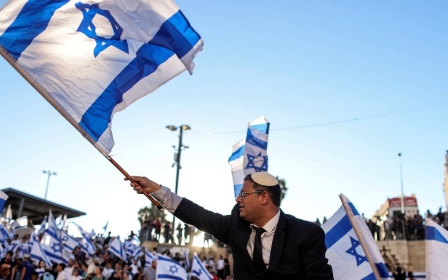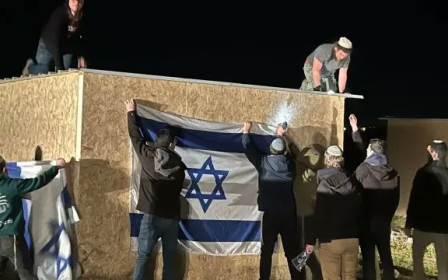Sheikh Jarrah: Far-right Israeli lawmaker Ben-Gvir refuses to leave makeshift office
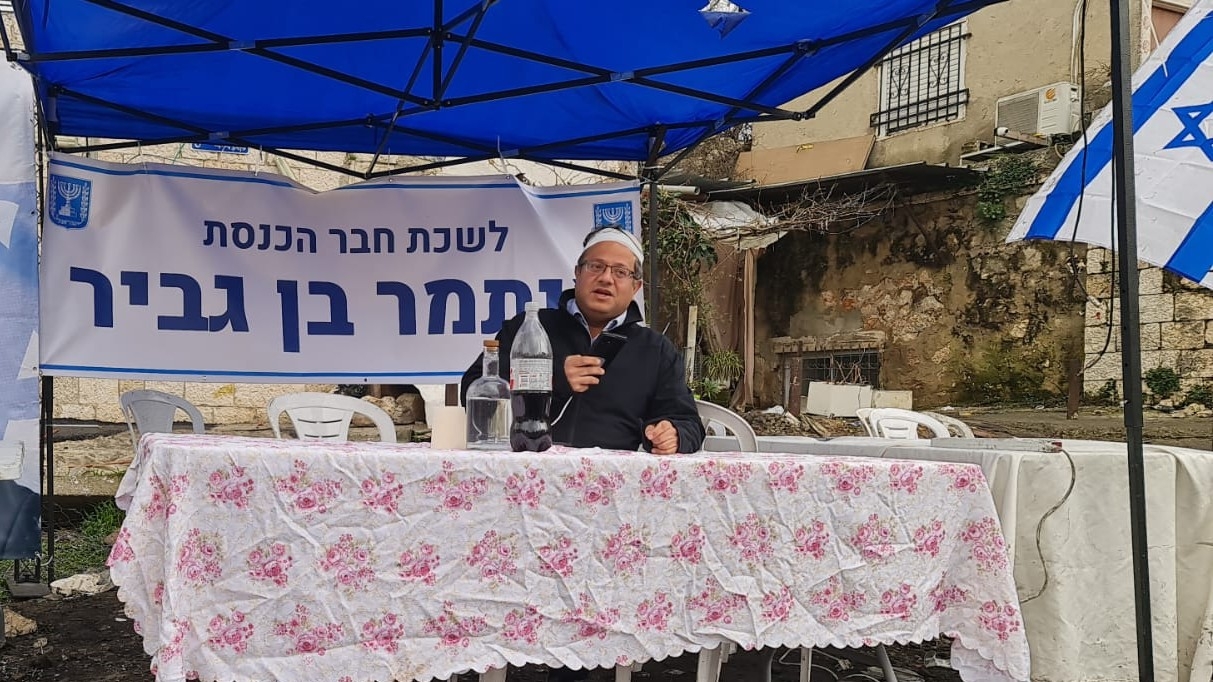
Far-right Israeli MP Itamar Ben-Gvir arrived on Monday morning at a makeshift office he and other settlers have set up on Palestinian land in occupied East Jerusalem's Sheikh Jarrah neighbourhood, a move that set off violence in what residents described as a "war zone".
A group of settlers led by Ben-Gvir on Sunday morning had erected a tent on land adjacent to the home of the Salem family, who are facing imminent expulsion, and set up a parliamentary office there.
According to local media, at least 31 people were injured on Sunday evening and overnight, including medics and a journalist, after Israeli forces used stun grenades and rubber-coated steel bullets to disperse Palestinian crowds who had gathered to stand in solidarity with the family.
"Until security is returned to the tomb of Shimon Hatzadik, my office will continue to operate here," Ben-Gvir, 45, said on Monday, using the Jewish name for the Sheikh Jarrah area.
"I will not give up and I will not rest until the security returns to the residents of the neighbourhood," he added in a tweet that included a picture of him sitting under a blue canopy in the office in Sheikh Jarrah.
Ben-Gvir, 45, the head of the Jewish Power party, is part of the Religious Zionism political alliance, which has four members in the Knesset.
They currently sit in the opposition aisle along with the Likud party and have been calling for the expulsion of Palestinians from their homes and lands and for the establishment of a homogeneous Jewish state run according to the Torah texts.
The Salem family are currently facing an Israeli court order to evict them from their house and land to make way for settlers.
Dozens of Palestinian families in Sheikh Jarrah are facing the same fate and could be expelled at any time from their houses.
Overwhelmed by lawsuits
Ben-Gvir has spearheaded settler efforts to seize the Salem family's plot of land, and last week attempted to establish a settlement outpost in the Negev, south of Israel, on lands where Palestinian citizens of Israel from the Bedouin community live.
The lawmaker was active during his youth in a settler group that was influenced by the ideas of Meir Kahane, an American-Israeli rabbi whose political movement was designated as a terrorist group by the US, following a massacre at the Ibrahimi Mosque in Hebron in the mid-1990s.
Sheikh Jarrah, which lies less than 2km from the northern walls of the Old City of Jerusalem, was occupied by Israel in 1967.
Since the 1980s, residents of the neighbourhood have been overwhelmed by lengthy and expensive lawsuits filed against them by settler groups in Israeli courts.
As a result, dozens of eviction orders have been issued over the years to Palestinian families to leave their homes and hand them to settlers.
Settlers had attempted several times to fence off the Salem family's land over recent weeks.
However, Palestinian and anti-occupation activists, along with members of the Salem family, had faced off the settlers and removed the wire fencing.
'Violence is obscene'
Israeli police had attempted on Sunday to remove Ben-Gvir and Bentzi Gopstein, another far-right leader, from the area and dismantle the office canopy.
Police also intervened as Ahmed Tibi, a Knesset member representing Palestinian citizens of Israel, and Jerusalem's pro-settler deputy mayor, Arieh King, quarrelled in Sheikh Jarrah.
Ben-Gvir said the police had attacked Israeli lawmakers on Sunday, publishing a picture of himself from hospital and tweeting that he was undergoing medical checks after he was assaulted by officers.
"Apparently there is an order to take down not just my parliamentary bureau, but myself as well. It won't help them," he said.
Omer Bar-Lev, Israel's minister of public security, tweeted that Ben-Gvir had assaulted an Israeli police officer there on Sunday evening.
"There has never been a Knesset member in Israel who raised a hand against a police officer. Immunity is sacred, violence is obscene," said Bar-Lev.
Lambasting Bar-Lev in response, Ben-Gvir said: "What a zero! Perhaps you are trying to evade responsibility that you are the one who gave the illegal order to infringe on my immunity, to dismantle my bureau and dismantle me."
Ben-Gvir also described Bar-Lev as "the most failed minister in the history of Israel! Go home!!!"
Last May, during widespread protests against the eviction of Palestinians in Sheikh Jarrah, Ben-Gvir also installed a makeshift office in the area, before dismantling it as tensions escalated and following a request by former prime minister Benjamin Netanyahu.
'Violation of international law'
Jordan, which had controlled the West Bank and East Jerusalem between 1949 and 1967, condemned the settlers' attempts to oust Palestinians from their houses in Sheikh Jarrah.
"The eviction and displacement orders for the residents of Sheikh Jarrah neighbourhood in occupied East Jerusalem are in violation of international law and international humanitarian law," Haitham Abu al-Ful, Jordan's ministry of foreign affairs spokesperson, said in a statement.
"Israel, as the occupying power in East Jerusalem, is obligated according to international law to protect the rights of Palestinians in their homes.
"The continuation of unilateral Israeli practices of confiscating Palestinian lands, demolishing homes and deporting Palestinians from their homes are illegal and illegal practices that perpetuate the occupation and undermine the chances of achieving a just and comprehensive peace," he added.
Middle East Eye delivers independent and unrivalled coverage and analysis of the Middle East, North Africa and beyond. To learn more about republishing this content and the associated fees, please fill out this form. More about MEE can be found here.


